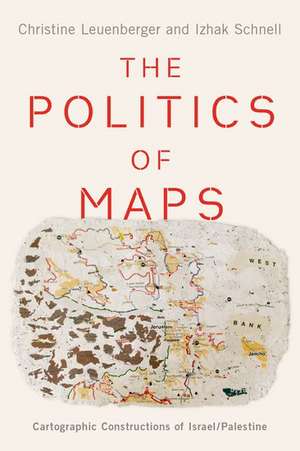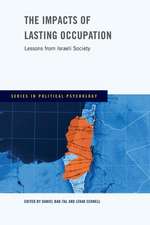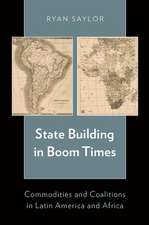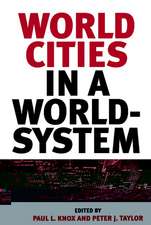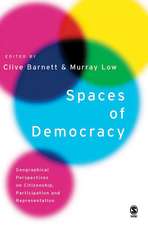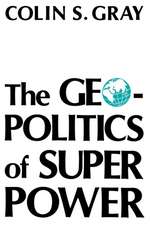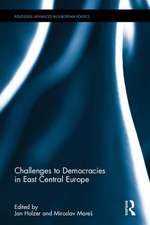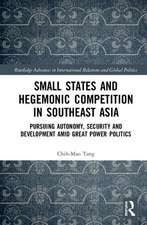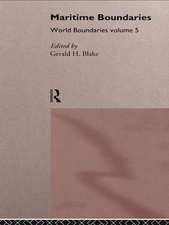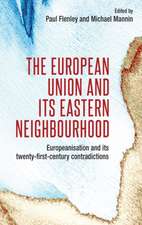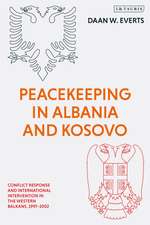The Politics of Maps: Cartographic Constructions of Israel/Palestine
Autor Christine Leuenberger, Izhak Schnellen Limba Engleză Hardback – 17 sep 2020
Preț: 589.74 lei
Preț vechi: 728.08 lei
-19% Nou
Puncte Express: 885
Preț estimativ în valută:
112.85€ • 122.96$ • 95.09£
112.85€ • 122.96$ • 95.09£
Carte disponibilă
Livrare economică 03-17 aprilie
Preluare comenzi: 021 569.72.76
Specificații
ISBN-13: 9780190076238
ISBN-10: 0190076232
Pagini: 244
Ilustrații: 47 maps and figures, with some in color
Dimensiuni: 236 x 157 x 23 mm
Greutate: 0.68 kg
Editura: Oxford University Press
Colecția OUP USA
Locul publicării:New York, United States
ISBN-10: 0190076232
Pagini: 244
Ilustrații: 47 maps and figures, with some in color
Dimensiuni: 236 x 157 x 23 mm
Greutate: 0.68 kg
Editura: Oxford University Press
Colecția OUP USA
Locul publicării:New York, United States
Recenzii
This book will benefit readers who are interested in the politicization of culture and science in Middle Eastern conflicts.
The book provides an excellent survey of how Israelis, and to a much lesser extent, Palestinians, assert their politics through maps. The authors achieve their stated purpose, which is to demonstrate how maps produce reality, rather than reflect it.
This book consistently shows the importance of maps as communication devices, providing insights that could otherwise not be gained, and how information from the field complements potential analyses based on probably unavailable direct observation. Additionally, access to local experts who can provide context to the geographical scene permits a fuller framework of understanding.... Summing Up: Highly recommended.
The fascinating book written by Christine Leuenberger and Izhak Schnell is the result of longstanding research that took years to appear in the final format of this book. And the result is worth waiting for. Published by Oxford University Press, The Politics of Maps will stay as a reference in the field of cartographic research applied to a rather complex case study, Israel-Palestine.
Overall, this fascinating, informative, and critical book is a must-read for anyone interested in political cartography or the Israel/Palestine conflict. The authors reveal a country with a highly professional and technological mapping process, but one that can at times be manipulated as a means of disseminating or emphasising specific political messages. In an era of digitised and Google maps, it is far less easy than in the past to advance one side of the conflict, yet Leuenberger and Schnell make clear just how important mapping and cartography remain within the political process.
In this remarkable book, Christine Leuenberger and Izhak Schnell have done a formidable job of demystifying, through the emblematic and concrete case of Israel/Palestine, the role of maps in state building. They establish that maps are merely representations, resulting from the processing of data through cognitive, cultural, and political filters. Their work is essential for understanding how mapping practices, far from being neutral and objective, are formidable tools for defining and legitimizing geographical knowledge and territorial imaginations.
Christine Leuenberger and Izhak Schnell leave no stone unturned as they trace the development and politics of mapping in one of the most contested territories on earth — Israel/Palestine. The two scholars offer a powerful analysis of central role of mapping in colonialism, nationalism, and Zionist nation-building, as well as in the futile attempts to achieve Palestine statehood. The book is a must for students, scholars and observers of this protracted political and cartographic drama.
The book provides an excellent survey of how Israelis, and to a much lesser extent, Palestinians, assert their politics through maps. The authors achieve their stated purpose, which is to demonstrate how maps produce reality, rather than reflect it.
This book consistently shows the importance of maps as communication devices, providing insights that could otherwise not be gained, and how information from the field complements potential analyses based on probably unavailable direct observation. Additionally, access to local experts who can provide context to the geographical scene permits a fuller framework of understanding.... Summing Up: Highly recommended.
The fascinating book written by Christine Leuenberger and Izhak Schnell is the result of longstanding research that took years to appear in the final format of this book. And the result is worth waiting for. Published by Oxford University Press, The Politics of Maps will stay as a reference in the field of cartographic research applied to a rather complex case study, Israel-Palestine.
Overall, this fascinating, informative, and critical book is a must-read for anyone interested in political cartography or the Israel/Palestine conflict. The authors reveal a country with a highly professional and technological mapping process, but one that can at times be manipulated as a means of disseminating or emphasising specific political messages. In an era of digitised and Google maps, it is far less easy than in the past to advance one side of the conflict, yet Leuenberger and Schnell make clear just how important mapping and cartography remain within the political process.
In this remarkable book, Christine Leuenberger and Izhak Schnell have done a formidable job of demystifying, through the emblematic and concrete case of Israel/Palestine, the role of maps in state building. They establish that maps are merely representations, resulting from the processing of data through cognitive, cultural, and political filters. Their work is essential for understanding how mapping practices, far from being neutral and objective, are formidable tools for defining and legitimizing geographical knowledge and territorial imaginations.
Christine Leuenberger and Izhak Schnell leave no stone unturned as they trace the development and politics of mapping in one of the most contested territories on earth — Israel/Palestine. The two scholars offer a powerful analysis of central role of mapping in colonialism, nationalism, and Zionist nation-building, as well as in the futile attempts to achieve Palestine statehood. The book is a must for students, scholars and observers of this protracted political and cartographic drama.
Notă biografică
Christine Leuenberger, PhD, is Senior Lecturer in the Department of Science & Technology Studies at Cornell University. Her work has been published in various academic journals, as well as in edited volumes and popular news outlets. She was a Fulbright Scholar, a Fulbright Specialist, and an American Association for the Advancement of Science Science & Technology Policy Fellow. Dr. Leuenberger was a recipient of a National Science Foundation Scholar's award to investigate the history and sociology of mapping practices in Israel and the Palestinian Territories. She is also conducting research on issues of migration and borders, and is engaged in peace and educational initiatives in the Middle East and Sub-Saharan Africa.Izhak Schnell, PhD, is Professor Emeritus in the Department of Geography and Human Environment at Tel Aviv University and former President of the Israeli Association of Geographers. His works focus on the analysis of social space under globalization and socio-spatialintegration and segregation of social groups in globalized realities, interpretations of the meanings of spaces and places including the representations of spaces and places like art and cartographic pieces and the monitoring of urban environments as risks for health and urban parks as restorative environments.
